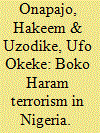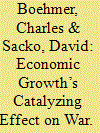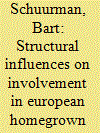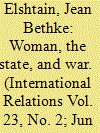|
|
|
Sort Order |
|
|
|
Items / Page
|
|
|
|
|
|
|
| Srl | Item |
| 1 |
ID:
117645


|
|
|
|
|
| Publication |
2012.
|
| Summary/Abstract |
Since the July 2009 Boko Haram terrorist outburst in Nigeria, there have been increasing questions on the phenomenon in the country. There has not been any substantial analysis on the emergence of the Boko Haram group and its terrorist activities in Nigeria as the out-rage continues. This study is advanced to explain the phenomenon of Boko Haram terrorism in Nigeria. It employs the levels of analysis framework popular in the field of international relations to explain the terrorism at three major levels: individual, state and international. The study relies on dependable news reports, which include interviews with key actors relevant to the subject matter, and finds that Boko Haram terrorism has its roots in the ideology and motivations of its founder and members, the failures and deficiencies of the Nigerian state, and the modern trend of religious terrorism in the international system.
|
|
|
|
|
|
|
|
|
|
|
|
|
|
|
|
| 2 |
ID:
192057


|
|
|
|
|
| Summary/Abstract |
This paper explains the circumstances where economic growth increases the likelihood of interstate war. Optimism created by high and sustained economic expansion permeates a state, increasing elite and mass optimism for the use of deadly force. Without relief, such unbridled sanguinity can lead states to war. However, other forces reduce the probability of war. Regional democracy, bilateral trade, and trade openness slow down the process where states go to war. This paper hypothesizes that key factors raise the temperature of disputes, increasing the likelihood of a political dispute combusting to war, while other attributes inhibit the process to war. Economic growth catalyzes such reactions, while regional and joint democracy impede the probability that a war sparks. This paper produces monadic and dyadic results demonstrating that economic growth increases the likelihood of war, while other factors such as interstate trade openness, bilateral trade, dyadic democracy, and regional democracy slow down the process of war, making war less likely.
|
|
|
|
|
|
|
|
|
|
|
|
|
|
|
|
| 3 |
ID:
180318


|
|
|
|
|
| Summary/Abstract |
Turkey and Israel have been strategic partners since the 1990s. Yet, there has occurred a deep crisis between the two countries, particularly since 2009, but the beginning of the deterioration in bilateral relations dates to the early 2000s. Today both countries designate each other as opponents despite the history of a strategic partnership. What are the reasons for this radical shift in the Turkish–Israeli relations? How might the stalemate in the relations be explained? This study analyses the rupture in the bilateral relations, particularly on the recent events that paved the way for a rupture and stalemate and evaluates it via three levels of analysis laid by Kenneth Waltz. The study argues that bilateral relations have taken shape at three levels in different times and that the deterioration and amelioration of the bilateral relations hinge upon the identity and ideology of the leadership at the individual level, domestic factors at the state level, and structural factors at the systemic level. In this regard, it seeks to reveal which of the levels of analysis are in play in the determination of bilateral relations since 1948.
|
|
|
|
|
|
|
|
|
|
|
|
|
|
|
|
| 4 |
ID:
077896


|
|
|
|
|
| Publication |
2007.
|
| Summary/Abstract |
The historical sociology of international relations is becoming an increasingly prominent field of enquiry. While advocates of an international historical sociology (IHS) have delivered a range of outstanding contributions, they have tended to revolve around the macro-scale, dealing with sweeping grand themes such as the nature of civilizations, the creation of world order, the advent of modernity, and the purpose and formation of the state. This article makes the case for incorporating micro-historical sociological analysis into IHS as a means of complementing already existing analyses, and providing a more rounded field of enquiry. The article argues that the micro-macro issue is an analytic strategy rather than an ontological choice, illustrating this point through a historical institutionalist variant of foreign policy analysis
|
|
|
|
|
|
|
|
|
|
|
|
|
|
|
|
| 5 |
ID:
159886


|
|
|
|
|
| Summary/Abstract |
This article empirically assesses the applicability of structural-level hypotheses for involvement in terrorism within the context of European homegrown jihadism. It uses these hypotheses to study how structural factors influenced involvement in the Dutch “Hofstadgroup.” Structural factors enabled the group’s emergence and its participants’ adoption of extremist views. They also motivated involvement in political violence and a shift in some participants’ focus from joining Islamist insurgents overseas to committing terrorism in the Netherlands. Finally, structural factors precipitated an actual terrorist attack. No support is found for the frequently encountered argument that discrimination and exclusion drive involvement in European homegrown jihadism. Instead, geopolitical grievances were prime drivers of this process.
|
|
|
|
|
|
|
|
|
|
|
|
|
|
|
|
| 6 |
ID:
171776


|
|
|
|
|
| Summary/Abstract |
Students often struggle to grasp how examining international phenomena at the systemic, state, or international level of analysis can yield different understandings or perspectives. To help students understand the dynamics at the different levels of analysis, we suggest the use of several short games that make students be “lab rats in their own experiments.” In this article, we discuss the mechanics of three short games we play with our students. We offer our qualitative impressions of the impact of these games on the understanding of the students.
|
|
|
|
|
|
|
|
|
|
|
|
|
|
|
|
| 7 |
ID:
105952


|
|
|
|
|
| Publication |
2011.
|
| Summary/Abstract |
This article aims to show the theoretical added value of focussing on discourse to study identity in international relations (IR). I argue that the discourse approach offers a more theoretically parsimonious and empirically grounded way of studying identity than approaches developed in the wake of both constructivism and the broader 'psychological turn'. My starting point is a critique of the discipline's understanding of the 'self' uncritically borrowed from psychology. Jacques Lacan's 'speaking subject' offers instead a non-essentialist basis for theorizing about identity that has been largely overlooked. To tailor these insights to concerns specific to the discipline I then flesh out the distinction between subject-positions and subjectivities. This crucial distinction is what enables the discourse approach to travel the different levels of analyses, from the individual to the state, in a way that steers clear of the field's fallacy of composition, which has been perpetuated by the assumption that what applies to individuals applies to states as well. Discourse thus offers a way of studying state identities without presuming that the state has a self. I illustrate this empirically with regards to the international politics of whaling.
|
|
|
|
|
|
|
|
|
|
|
|
|
|
|
|
| 8 |
ID:
090150


|
|
|
|
|
| Publication |
2009.
|
| Summary/Abstract |
Does `gender' as a category of analysis or as a central feature of a logic of explanation alter in significant ways Kenneth Waltz's famous `levels of analysis' as developed in his classic, Man, the State, and War? One overriding claim of feminist international relations has been that `gender' alters all levels of analysis; thus, changing `man' to `woman' in the formulation `man, the state, and war' significantly transforms our understanding of international relations. I evaluate this claim critically by assessing the adequacy of feminist formulations on each of Waltz's levels of analysis and, further, by unpacking Waltz's own understanding of these levels. I conclude that Waltz remains enormously helpful in deconstructing reductionist accounts, especially on the `first level' of analysis, but that his own account is problematic insofar as it insists on a `structural analysis' sundered from his levels 1 and 2, namely, wars flow from human nature or, alternatively, from the domestic ordering of states. I point out that Waltz himself leaves some `wiggle room' in his book that permits one to `plug in' features of the first two levels of analysis that are critical to understanding the structural level. In other words, all three levels must be in play if one is to craft a compelling explanatory framework.
|
|
|
|
|
|
|
|
|
|
|
|
|
|
|
|
|
|
|
|
|